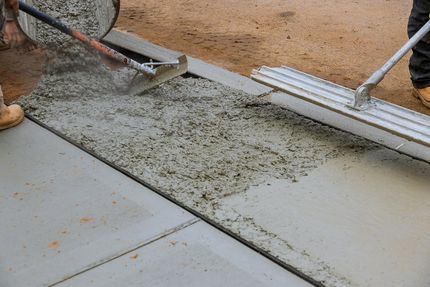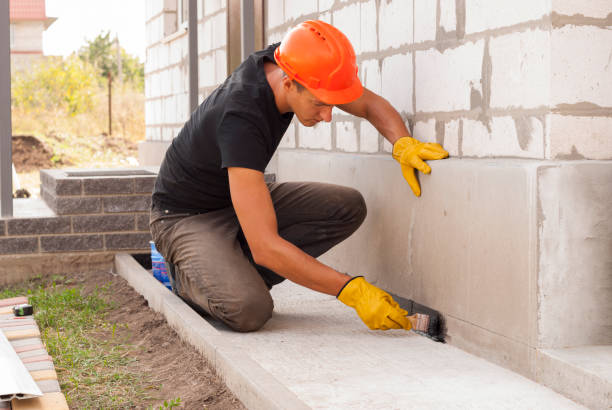
Understanding the Crucial Role of a Concrete Service Provider in Modern Building And Construction and Design
Concrete service providers are important to the building and design markets. Their expertise warranties that structures are not just durable but likewise cosmetically pleasing. They involve in different duties, from task preparing to high quality control, and collaborate with engineers and engineers. With developing modern technologies and trends, their function is a lot more crucial than ever. Recognizing their impact can disclose understandings into modern-day construction techniques and the future of structure design.
The Relevance of Concrete in Building and construction
Various products are utilized in building, concrete remains a keystone of contemporary structure techniques due to its durability, stamina, and versatility. This composite material, made from cement, water, and aggregates, can endure considerable stress and is resistant to fire, weather, and parasites, making it perfect for diverse applications. Concrete's flexibility permits it to be molded into various shapes and dimensions, facilitating cutting-edge architectural layouts.
Its thermal mass homes add to power performance, helping to regulate indoor temperatures. The extensive accessibility of basic materials and the reasonably inexpensive of concrete likewise improve its allure for massive tasks, from commercial structures to infrastructure like roadways and bridges. As urbanization remains to increase, the need for sustainable and trustworthy structure materials strengthens concrete's vital function in building, making it a basic selection for building contractors and designers intending for longevity and strength in their jobs.
Secret Duties of a Concrete Professional
Concrete contractors play a vital role in the construction procedure, with numerous crucial responsibilities that guarantee project success. Their jobs include task planning and design, product option and management, along with maintaining high quality control and assurance throughout the task lifecycle. Comprehending these duties is crucial for valuing the service provider's effect on construction outcomes.
Job Planning and Layout
When beginning on a building and construction job, effective project planning and layout play a vital function in a concrete specialist's duties. The professional should work together carefully with clients, engineers, and designers to recognize the task's requirements and objectives. This includes evaluating site conditions, evaluating style demands, and identifying the range of job. A concrete contractor is additionally responsible for developing timelines and budget plans, making sure that all stages of the job line up with overall purposes. Additionally, they should expect possible difficulties and design services to preserve task effectiveness. By meticulously preparing and developing each element of the concrete job, the service provider establishes the foundation for effective execution, ensuring architectural integrity and adherence to security requirements throughout the construction procedure.
Material Choice and Management
Effective product selection and management are vital duties for a concrete service provider, as these choices straight affect the top quality and longevity of the last structure. Concrete service providers have to examine different products, consisting of accumulations, admixtures, and support types, to guarantee they meet task specs and ecological conditions. They have to consider factors such as resistance, workability, and stamina to weathering. In addition, managing the supply chain is crucial, as timely shipment of materials can extremely affect project timelines. Service providers need to maintain connections with distributors to secure premium sources while likewise keeping an eye on supply degrees to avoid excesses or scarcities. Inevitably, this cautious choice and monitoring of materials add to the general success of building tasks and the durability of the frameworks developed.
Top Quality Control and Assurance
Quality control and guarantee are vital in the construction industry, particularly for concrete professionals entrusted with supplying resilient and reliable frameworks. Concrete contractors need to implement extensive quality assurance measures throughout the building and construction process, ensuring that all materials fulfill defined criteria and laws (Concrete Contractor Near Me). This consists of keeping track of the blending, pouring, and curing procedures to stop flaws and enhance architectural integrity. Regular assessments are important, enabling specialists to identify and correct concerns immediately. Additionally, concrete contractors often collaborate with engineers and architects to guarantee that the end product lines up with style specs. By adhering to rigorous top quality assurance procedures, concrete service providers not just secure the longevity of their job however also maintain the trust of customers and stakeholders in the building market
Sorts Of Projects Taken Care Of by Concrete Contractors
Concrete service providers are frequently associated with large-scale construction tasks, their experience prolongs to a varied variety of applications. These specialists are essential to household jobs, such as driveways, outdoor patios, and foundations, ensuring longevity and aesthetic appeal. In industrial construction, they add to the creation of floors, sidewalks, and structural aspects that satisfy certain layout and safety standards.
Additionally, concrete contractors are associated with facilities tasks, consisting of passages, roads, and bridges, where their abilities assure architectural stability and durability. They additionally play an essential function in ornamental concrete applications, such as stamped concrete and polished surface areas, which improve the appearance of different rooms. Furthermore, their services reach fix get more info and maintenance job, addressing issues like cracking or erosion in existing frameworks. This adaptability highlights the essential duty concrete specialists play in both practical and attractive aspects of modern building and style.
Skills and Qualifications Required
Concrete contractors must have a varied set of abilities and qualifications to efficiently handle the variety of projects they undertake. Effectiveness in concrete blending, pouring, and finishing is essential, as is a solid understanding of different sorts of concrete, including strengthened and ornamental options. Knowledge of building and construction strategies, blueprints, and task monitoring principles is critical for successful implementation.
In addition, physical endurance and toughness are essential as a result of the requiring nature of the job. Specialists should likewise have solid problem-solving capacities to attend to unforeseen challenges throughout tasks. Communication skills are critical for coordinating with clients, designers, and various other tradespeople.
Additionally, getting relevant accreditations can boost a specialist's integrity and expand their profession opportunities. Constant education in new methods and products keeps contractors affordable in a quickly evolving sector. These abilities and qualifications jointly make it possible for concrete specialists to provide high-quality results efficiently and successfully.
The Function of Concrete Professionals in Safety Compliance
Guaranteeing safety conformity is a basic responsibility of concrete contractors, as they navigate the complexities of building and construction sites. These specialists are entrusted with sticking to stringent safety regulations and criteria, which are essential for stopping mishaps and ensuring the health of all site workers. Concrete Contractor in Dallas. Concrete contractors need to implement complete safety and security plans that include training personnel on proper tools use and security procedures
Furthermore, they are in charge of inspecting products and work procedures to identify prospective risks. By carrying out routine security audits and danger evaluations, concrete service providers can proactively deal with problems before they escalate. Moreover, they work together with other building specialists, such as engineers and job supervisors, to incorporate safety steps right into the general task method. Ultimately, the dedication of concrete specialists to safety and security compliance not only shields employees however also boosts job efficiency and quality, reinforcing their crucial duty in modern-day construction.
Fads and Developments in Concrete Style
Recent developments in concrete style have actually presented a variety of patterns and developments that focus on sustainability and aesthetics. Lasting concrete remedies, decorative finishing techniques, and smart concrete modern technologies are improving the industry. These advancements not only improve architectural honesty but also add to ecologically responsible building techniques.
Sustainable Concrete Solutions
As the building market increasingly prioritizes sustainability, ingenious concrete options are emerging to reduce environmental influence while boosting performance. One popular fad is using recycled products, such as crushed concrete and industrial by-products, which not only lowers waste yet likewise boosts the concrete's properties. Advancements in admixtures, including fly ash and slag, contribute to minimized carbon emissions throughout production. Another considerable development involves the advancement of permeable concrete, which enables water to move through and reduces overflow, alleviating flooding and groundwater deficiency. In addition, the surge of carbon capture innovations in concrete production holds pledge for further emissions reduction. These lasting concrete options exemplify the market's commitment to environmentally liable building methods.

Attractive Completing Methods
A variety of ornamental completing methods have actually emerged in concrete layout, changing simple surfaces right into aesthetically striking components. Strategies such as stamping, staining, and polishing permit a large range of aesthetic opportunities, accommodating varied design preferences. Stamped concrete mimics natural products like stone and block, while staining introduces dynamic colors that improve the surface area's charm. Refined concrete, recognized for its streamlined surface, adds sophistication to both domestic and industrial spaces. Additionally, microtopping and overlay systems supply ingenious alternatives for revitalizing existing concrete. These strategies not just enhance the aesthetic characteristics however additionally boost resilience and maintenance. As trends advance, the combination of attractive finishes remains to play an important duty in modern building and construction, weding functionality with artistic expression.

Smart Concrete Technologies
While standard concrete continues to be a staple in building, the development of smart concrete modern technologies is reinventing the market by integrating advanced functions that enhance efficiency and sustainability. These developments consist of self-healing concrete, which utilizes embedded germs that trigger upon breaking, and sensor-equipped concrete that monitors architectural health in real-time. Additionally, thermochromic and piezoelectric concrete can adjust to ecological modifications and create electrical energy, respectively. The execution of eco-friendly ingredients and recycled materials also adds to lowering the carbon footprint of concrete manufacturing. As these technologies remain to progress, they promise to enhance longevity, lower upkeep costs, and promote greener structure practices, making them crucial for future building tasks. The role of concrete service providers is significantly considerable in using these improvements.
Regularly Asked Inquiries
What Factors Impact Concrete Rates in Building And Construction Jobs?
Concrete rates in building and construction tasks is affected by material costs, labor costs, job size, place, schedule of sources, and market demand. Seasonal factors and transport costs can likewise substantially influence the general rates framework.
Just How Do Climate Condition Influence Concrete Job?
Weather significantly influence concrete work; extreme temperatures, humidity, and rainfall can influence setting times, healing procedures, and overall high quality - Concrete Contractor in Dallas. Specialists should adjust their approaches and timetables to minimize these ecological effects for successful job conclusion
What Is the Regular Timeline for a Concrete Task?
A regular concrete job timeline varies from a couple of days to numerous weeks. Variables affecting this duration include project dimension, complexity, weather problems, and treating times, which collectively determine the overall completion timetable.
Can Concrete Service Providers Aid With Style Consultations?
Concrete contractors can undoubtedly assist with design consultations, giving useful insights on material option, structural integrity, and visual options, making sure that jobs satisfy both functional needs and the customer's vision for the finished item.
What Are Typical Mistaken Beliefs About Concrete Durability?
Usual misunderstandings concerning concrete toughness include the belief that it is unsusceptible damage and that all types are equally solid. Actually, variables like mix layout, environmental problems, and maintenance considerably affect concrete's long-lasting efficiency.
They also play a critical function in ornamental concrete applications, such as stamped concrete and sleek surface areas, which enhance the visual element of various areas. Efficiency in concrete blending, pouring, and finishing is necessary, as is a solid understanding of numerous types of concrete, including strengthened and decorative options. One famous trend is the usage of recycled products, such as crushed concrete and commercial byproducts, which not just decreases waste however also improves the concrete's buildings. While typical concrete remains a staple in construction, the introduction of clever concrete modern technologies is transforming the industry by incorporating advanced functions that boost efficiency and sustainability. These technologies consist of self-healing concrete, which utilizes embedded bacteria that turn on upon splitting, and sensor-equipped concrete that checks architectural health in real-time.